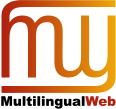Monthly Archives: March 2014
Posts
Two new editor’s drafts for review
In line with decisions taken by the Working Group several months ago, the editor’s copies of two Internationalization WG Notes have been significantly changed.
The information has been overhauled to bring it up to date with recent changes to various articles, in line with changes in HTML and CSS.
The new versions have also been paired down to a set of do’s and don’ts, with pointers to more detailed explanations in other articles on the i18n site, plus some introductory material that is not found elsewhere. This significantly reduces duplication of information, and thereby improves usability and maintainability of the content.
The documents in question are:
If you have any comments on these documents, please send them to www-international@w3.org before 12 April. We hope to replace the current versions of these Notes with the new versions shortly after.
Extend your stay for the upcoming MultilingualWeb workshop! Join the LIDER Workshop 8-9 May, to discuss Wikipedia, Multilingual Analytics and Linked Data for Language Resources

Aligned with the MultilingualWeb workshop (7-8 May, Madrid), the LIDER project is organizing a roadmapping workshop 8-9 May. The 8 May afternoon session will provide a keynote by Seth Grimes and also focus on the topic of Wikipedia for multilingual Web content. Via several panels including contributions from key Wikipedia engineers, we will discuss cross lingual analytics and intelligent multilingual content handling in Wikipedia. On 9 May, a 1/2 day session will focus on aspects of migrating language resources into linked data.
Mark your calendar now! A dedicated registration form including ways to contribute to the workshop agenda will be made available soon.
CLDR Version 25 Released
Unicode CLDR 25 has been released, providing an update to the key building blocks for software supporting the world’s languages. This data is used by a wide spectrum of companies for their software internationalization and localization, adapting software to the conventions of different languages for such common software tasks.
Unicode CLDR 25 focused primarily on improvements to the LDML structure and tools, and on consistency of data. There are many smaller data fixes, but there was no general data submission. Changes include the following:
- New rules for plural ranges (1-2 liters) for 72 locales, plurals for 2 locales, and ordinals for 18 locales.
- Better locale matching with fallbacks for languages, default languages for continents and subcontinents, and default scripts for more languages.
- Two new locales: West Frisian (fy) and Uyghur (ug).
- Two new metazones: Mexico_Pacific and Mexico_Northwest
- Updated zh pinyin & zhuyin collations and translators for Unicode 6.3 kMandarin data
- Updated keyboard layout data for OSX, Windows and others.
This version contains data for 238 languages and 259 territories—740 locales in all.
Details are provided in http://cldr.unicode.org/index/downloads/cldr-25, along with a detailed Migration section.
Updated article: Declaring character encodings in HTML
This update brings the article in line with recent developments in HTML5, and de-emphasizes information about legacy formats.
An attempt was also made to organize the material so that readers can find information more quickly, and also de-clutter the essential information by moving edge topics, such as UTF-16 and charset links, down the page. This led to the article being almost completely rewritten.
A new boilerplate and styling has also been applied to the article.
German, Spanish, Russian, Swedish and Ukrainian translators are asked to update their translation of this article within the next month, otherwise the translations will be removed per the translation policy, since the changes are substantive.
Speaker deadline for Madrid MultilingualWeb Workshop is Friday, March 14
We would like to remind you that the deadline for speaker proposals for the 7th MultilingualWeb Workshop (May 7–8, 2014, Madrid, Spain) is on Friday, March 14, at 23:59 UTC.
Featuring a keynote by Alolita Sharma (Director of Engineering, Wikipedia) and breakout sessions on linked open data and other critical topics, this Workshop will focus on the advances and challenges faced in making the Web truly multilingual. It provides an outstanding and influential forum for thought leaders to share their ideas and gain critical feedback.
While the organizers have already received many excellent submissions, there is still time to make a proposal, and we encourage interested parties to do so by the deadline. With roughly 200 attendees anticipated for the Workshop from a wide variety of profiles, we are certain to have a large and diverse audience that can provide constructive and useful feedback, with stimulating discussion about all of the presentations.
For more information and to register, please visit the Madrid Workshop Call for Participation.
New translation into Japanese
HTMLとXMLにおける言語タグ (Language tags in HTML and XML)
This article was translated into Japanese thanks to Momdo Nakamura.
W3C® liability, trademark and permissive license rules apply.
Questions or comments? ishida@w3.org